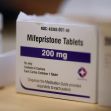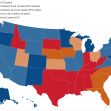On Friday, Louisiana Governor Jeff Landry signed Senate Bill 276 into law, reclassifying two commonly used abortion-inducing drugs, Mifepristone and Misoprostol, as Schedule IV controlled substances. This legislative move makes Louisiana the first state in the United States to classify these drugs as controlled substances.
Under the new law, the general penalty for possessing Mifepristone or Misoprostol includes imprisonment for one to five years, potentially with hard labor, and a fine of up to $5,000. Additionally, the bill criminalizes causing another person's abortion through fraudulent means, with severe penalties of 10 to 20 years of imprisonment with hard labor and a fine of $100,000.
Governor Landry emphasized the protective intent of the bill, stating, "Requiring an abortion-inducing drug to be obtained with a prescription and criminalizing the use of an abortion drug on an unsuspecting mother is nothing short of common sense. This bill protects women across Louisiana and I was proud to sign this bill into law today."
Louisiana's definition of Schedule IV controlled substances includes drugs with a low potential for abuse and causing limited physical or psychological dependence compared to substances in higher schedules. These substances must also have accepted medical uses in the United States.
Mifepristone and Misoprostol are typically used within the first 11 weeks of pregnancy to induce abortion. Mifepristone halts the progression of pregnancy, while Misoprostol induces cramping and bleeding to expel the uterine contents. This method is generally administered by taking Mifepristone followed by Misoprostol within 48 hours.
The passage of Senate Bill 276 follows the U.S. Supreme Court decision in Dobbs v. Jackson Women’s Health Organization two years ago, which overturned nearly 50 years of precedent that had recognized and protected a constitutional right to abortion prior to viability at 24 weeks. The law will come into effect on October 1.
Planned Parenthood, among other reproductive rights organizations, has highlighted the critical role these drugs play in providing safe and effective abortion care. They warn that restricting access could lead to increased risks for those seeking abortions, particularly in a state like Louisiana, which already has stringent abortion laws.






